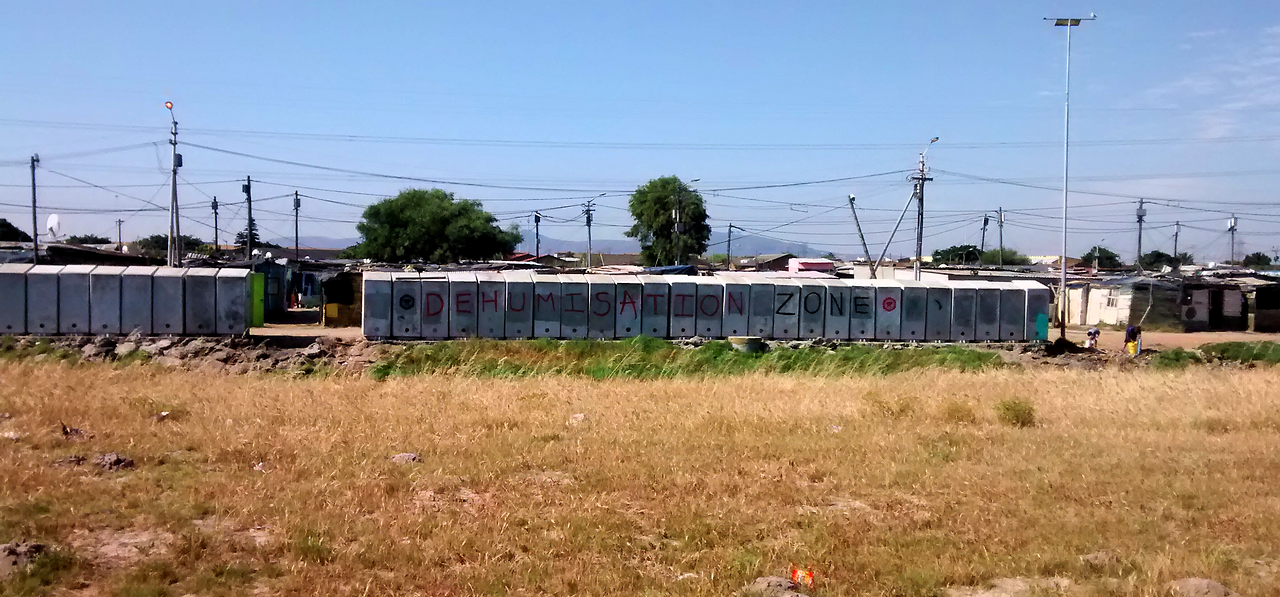
Students opposed tuition hikes arguing that poor youths living in slums like Joe Slovo shack settlement will not afford higher education in South Africa. Image source: http://tokolosstencils.tumblr.com/. Used with permission
South African citizens on Twitter are increasingly using 140 characters to facilitate political debates. Hashtags specifically have become one of the most popular ways of organising protests, building movements and expressing anger over political decisions in the country.
Here are some of the more popular hashtags in South African politics today.
#FeesMustFall
The South African government announced in 2015 that it planned to increase university tuition fees in 2016 by as much as 12 percent. Students argued that the increase will keep poor, mostly black South Africans from higher education.
Students, parents, politicians, and celebrities used the hashtag #FeesMustFall [1] to voice their anger and disapproval [2]of the hikes. It was one of top hashtags [3]for 2015 in South African news.
#FeesHaveFallen
Following #FeesMustFall nationwide protests that brought South African universities to a standstill, the South African government announced that there would be no fee hike. Students and their supporters celebrated their victory [4] with the hashtag #FeesHaveFallen [5].
#NationalShutdown
Apart from #FeesMustFall, students opposing tuition increases used the hashtag #NationalShutdown [6]. The hashtag was used to call for the temporary closure of universities in the country. The hashtag became number eight [7]on the list of worldwide trends at the time.
#ZumaMustFall
The #ZumaMustFall [8] hashtag came as a result of President Jacob Zuma’s sacking of finance minister [9] Nhlanhla Nene. He replaced Nene with David van Rooyen, but public pressure online and offline forced him to replace Rooyen with the current Finance Minister Pravin Gordhan.
#PayBackTheMoney and #WeWantTheMoney
Last year, a report by South Africa's Public Protector Thuli Madonsela found that President Jacob Zuma unduly benefited from security upgrades to his Nkandla homestead [10], which cost tax payers about 250 million rands, or US$25 million. The public protector subsequently asked Zuma to repay part of the money back to the state. She instructed the president and the treasury to work together to arrive at a figure.
#PayBackTheMoney [11] and #WeWantTheMoney [12] are the key hashtags used by those putting pressure on President Zuma to pay back the money. In February 2016, President Zuma said that [13] he will pay back the money but he was waiting “for parliamentary processes to decide on how to act.”
#RhodesMustFall
Rhodes Must Fall [14] is a protest movement that began on 9 March 2015 with the aim of getting the Cecil Rhodes [15] statue at the University of Cape Town removed. As a result of #RhodesMustFall [16], the statue was taken down on 9 April 2015.
Cecil John Rhodes [15] was a British businessman and politician in South Africa. A strong believer in British imperialism, his British South Africa Company [17]founded the southern African territory of Rhodesia [18] (now Zimbabwe and Zambia), which the company named after him in 1895.
His statue, therefore, was considered to be a symbol of imperialism and colonialism.
#AfrikaansMustFall
A debate, using the hashtag #AfrikaansMustFall [19], is going on in South Africa about the use of the language Afrikaans [20] as a medium of instructions in universities.
In the past few weeks, protests have erupted [21] over the issue particularly at the University of Pretoria. Protesters argue that the use of Afrikaans marginalises students who do not speak it. Afrikaans, a West Germanic language mostly spoken in South Africa and Namibia, is the third largest language in South Africa after Zulu and Xhosa. There are 11 official languages in South Africa.
#GuptaGate
President Jacob Zuma is accused [22]of allowing members of the wealthy Indian-born Gupta family to make decisions on state matters including offering select individuals cabinet positions [23]. #GuptaGate [24] is one [25] of the biggest scandals [26] in Zuma's presidency.
According to News24 [27], Guptagate began in April 2013 when a commercial plane carrying visitors of the Gupta family landed at a military airfield, Waterkloof Air Force Base, in breach of state security.
South Africa's deputy Finance Minister Mcebisi Jonas revealed this month [28] that Gupta family had offered him the position of minister of finance but that he had rejected it.
Former National African Congress Member of Parliament Vytjie Mentor has also claimed that [29] the family offered her a ministerial position but she turned it down.